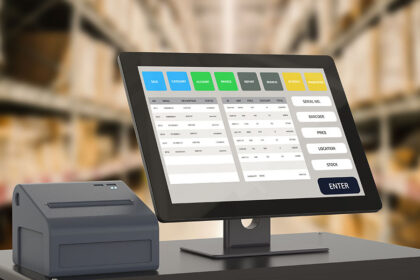
Introduction:
In the dynamic world of retail, where transactions are more than just exchanges of goods for currency, the need for efficient and streamlined operations has never been more critical. Enter the Point of Sale (POS) system, a technological cornerstone that has transformed the way retail companies conduct business. In this in-depth exploration, we will unravel the myriad reasons why a retail company needs a POS system, from enhancing customer experience to optimizing inventory management and beyond.
Part 1: The Evolution of Point of Sale Systems
A Brief History
The concept of a Point of Sale system can be traced back to the early 20th century when cash registers were first introduced to streamline sales transactions. Fast forward to the digital age, and we find ourselves in an era where POS systems have evolved into sophisticated, multifaceted tools that go beyond mere transaction processing.
From Cash Registers to Cloud-Based Systems
Modern POS systems have transcended the limitations of traditional cash registers. Cloud-based POS solutions now offer businesses the flexibility to manage transactions, inventory, and customer data in real-time, both in-store and online.
Part 2: Streamlining Transactions and Enhancing Customer Experience
Efficient Transaction Processing
At its core, a POS system serves as the central hub for processing transactions. Whether it’s handling cash, credit cards, or emerging payment methods like mobile wallets, a well-implemented POS system ensures quick and accurate transaction processing, reducing wait times and enhancing the overall customer experience.
Customizable Payment Options
With the increasing diversity in payment preferences, a modern POS system enables businesses to accept various payment methods seamlessly. From chip and pin to contactless payments, the versatility of POS systems caters to the preferences of a broad customer base.
Loyalty Programs and Customer Relationship Management (CRM)
POS systems can be integrated with loyalty programs and CRM tools, allowing businesses to track customer behavior, preferences, and purchase history. This data empowers retailers to create personalized shopping experiences, offer targeted promotions, and foster customer loyalty.
Part 3: Inventory Management: A Game-Changer for Retailers
Real-Time Inventory Tracking
One of the most compelling reasons for a retail company to invest in a POS system is the ability to track inventory in real-time. Automated updates ensure that businesses have accurate information about stock levels, reducing the likelihood of overstocking or stockouts.
Product Variants and SKUs
Retailers dealing with diverse product ranges and variants benefit significantly from POS systems that can manage a vast array of Stock Keeping Units (SKUs). This capability streamlines the tracking of different product configurations and helps in maintaining optimal stock levels.
Purchase Order and Vendor Management
POS systems facilitate the creation and tracking of purchase orders, simplifying the procurement process. Integration with vendor management systems ensures a seamless flow of information between retailers and suppliers, promoting efficiency and reducing errors.
Part 4: Data-Driven Decision Making
Sales Analytics
POS systems generate a wealth of data related to sales trends, customer behavior, and product performance. Retailers can leverage analytics tools integrated with POS systems to gain valuable insights, enabling data-driven decision-making to optimize pricing, marketing strategies, and inventory management.
Performance Metrics and KPIs
Key Performance Indicators (KPIs) are essential for evaluating the success of a retail business. A POS system provides access to performance metrics such as sales per square foot, inventory turnover rates, and customer conversion rates, empowering retailers to make informed decisions to enhance overall business performance.
Integration with Business Intelligence Tools
POS systems often integrate with business intelligence tools, enabling retailers to create comprehensive reports and dashboards. This integration allows for a holistic view of the business, facilitating strategic planning and continuous improvement.
Part 5: Enhanced Security and Fraud Prevention
Secure Payment Processing
The security of customer payment information is a paramount concern for retailers. Modern POS systems employ robust encryption and security protocols to safeguard sensitive data, reducing the risk of payment fraud and ensuring compliance with industry standards.
User Authentication and Access Control
POS systems offer features such as user authentication and access control, allowing businesses to define roles and permissions for employees. This ensures that only authorized personnel have access to sensitive functions within the system, enhancing overall security.
Fraud Detection Algorithms
Some advanced POS systems are equipped with fraud detection algorithms that analyze transaction patterns to identify unusual or suspicious activities. This proactive approach helps retailers mitigate the risk of fraudulent transactions.
Part 6: Seamless Integration with E-Commerce
Omnichannel Retailing
In the age of e-commerce, retailers need to adopt an omnichannel approach to meet customer expectations. A POS system that seamlessly integrates with e-commerce platforms enables businesses to synchronize online and in-store operations, providing a cohesive shopping experience for customers.
Unified Inventory Management
Integration between POS systems and e-commerce platforms ensures unified inventory management. This means that changes in stock levels, product information, and pricing are reflected in real-time across all sales channels, reducing discrepancies and enhancing operational efficiency.
Customer Data Synchronization
For retailers operating both online and offline, maintaining consistency in customer data is crucial. POS systems with integrated e-commerce solutions synchronize customer information, ensuring a unified profile and personalized experience across all touchpoints.
Part 7: Regulatory Compliance and Reporting
Tax Calculation and Reporting
Retailers need to comply with various tax regulations, and POS systems can automate tax calculations based on the location and nature of transactions. Furthermore, these systems generate comprehensive reports that facilitate compliance with tax reporting requirements.
Receipts and Documentation
Accurate and detailed documentation is essential for auditing and compliance purposes. POS systems automate the generation of receipts, invoices, and transaction records, reducing the risk of errors and ensuring that retailers maintain proper documentation in accordance with regulations.
Accessibility for Audits
In the event of an audit, having a centralized system that stores comprehensive transaction data simplifies the process. POS systems provide auditors with access to a detailed and organized record of financial transactions, improving transparency and compliance.
Part 8: Scalability and Future-Proofing
Adapting to Business Growth
As a retail company expands, its operational requirements evolve. A scalable POS system can adapt to the changing needs of a growing business, accommodating an increasing number of transactions, products, and users without compromising performance.
Technology Upgrades and Compatibility
In a rapidly evolving technological landscape, future-proofing is crucial. A modern POS system is designed to be compatible with emerging technologies, ensuring that retail businesses can seamlessly integrate new tools, devices, and features as they become available.
Cloud-Based Flexibility
Cloud-based POS systems offer unparalleled flexibility, allowing retailers to access their data and manage operations from anywhere with an internet connection. This cloud-based architecture facilitates remote management and ensures that businesses can stay agile in an ever-changing market.
Part 9: Choosing the Right POS System
Understanding Business Needs
Selecting the right POS system involves understanding the unique needs of a retail business. Factors such as the type of products sold, the volume of transactions, and the desired level of integration with other business systems play a crucial role in determining the most suitable POS solution.
Researching Features and Providers
Different POS systems come with varying features and capabilities. Retailers should thoroughly research available options, considering features such as inventory management, payment processing, integration capabilities, and user-friendliness. Additionally, evaluating the reputation and support services of POS providers is essential.
Conclusion
In conclusion, the adoption of a robust Point of Sale (POS) system is no longer a choice but a strategic necessity for retail companies. From enhancing customer experience and streamlining transactions to optimizing inventory management and enabling data-driven decision-making, the multifaceted benefits of a modern POS system are undeniable. As the retail landscape continues to evolve, investing in the right POS solution becomes a pivotal step in ensuring operational efficiency, staying competitive, and unlocking new avenues for growth. Embrace the transformative power of technology, and let your retail business thrive in the era of modern commerce.
